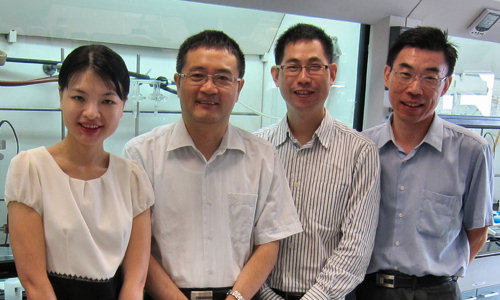In the future, the clothes you wear could be made from sugar. Researchers at the Institute of Bioengineering and Nanotechnology (IBN) have discovered a new chemical process that can convert adipic acid directly from sugar.
The IBN research team, who invented the new green chemistry method to turn sugar into adipic acid (from left) Dr Ting Lu, Dr Yugen Zhang, Dr Xiukai Li and Dr Guangshun Yi.
Adipic acid is an important chemical used to produce nylon for apparel and other everyday products like carpets, ropes and toothbrush bristles. Commercially, adipic acid is produced from petroleum-based chemicals through the nitric acid oxidation process, which emits large amounts of nitrous oxides, a major greenhouse gas that causes global warming.
IBN Executive Director Professor Jackie Y. Ying said, “In the face of growing environmental concerns over the use of fossil fuels and diminishing natural resources, there is an increasing need for a renewable source for energy and chemicals. We have designed a sustainable and environmentally friendly solution to convert sugar into adipic acid via our patented catalytic process technology.”
Bio-based adipic acid can be synthesized from mucic acid, which is oxidized from sugar; and the mucic acid can be obtained from fruit peels. Current processes are either performed using multiple steps with low product efficiency and yield, or under harsh reaction conditions using high-pressure hydrogen gas and strong acids, which are costly and unsafe.
The new chemical catalytic protocol designed by IBN is simple, efficient and green. To convert mucic acid to adipid acid, the target reaction is deoxydehydration, that is, oxygen and water will be removed simultaneously by reduction and dehydration. The researchers found that by combining deoxydehydration and the transfer hydrogenation reaction – adding an alcohol solvent – in one reactor, they could obtain a high yield of adipic acid at 99% of the starting material. Existing protocols can only achieve a yield of around 60%.
This method is ideal for industrial development because the process can be performed in one or two steps, the end product is pure, and the reaction conditions are mild and safe.
Dr Yugen Zhang, IBN Group Leader in green chemistry and energy said, “This work shows the tremendous potential of developing bio-based adipic acid. We are excited that our new protocol can efficiently convert adipic acid from sugar, bringing us one step closer toward industrialization. To complete this green technology, we are now working on using raw biomass as the feedstock.”
This finding was published recently in the leading Chemistry journal Angewandte Chemie International Edition. The work was funded by a grant from the A*STAR Science and Engineering Council to develop chemicals from biomass.
Dr Yugen Zhang’s group also holds patented technologies for converting other valuable chemical intermediates such as 5-hydroxymethylfurfural (HMF) and furfuraldicarboxylic acid (FDCA) from sugar. HMF is a key platform chemical that can be converted to biofuels and biochemicals, and FDCA can be used to make plastics and polyester. IBN seeks industrial collaborations to commercialize its portfolio of green technologies.
Story Source:
The above story is based on materials provided by Agency for Science, Technology and Research (A*STAR), Singapore, Elena Tan and Nidyah Sani.





